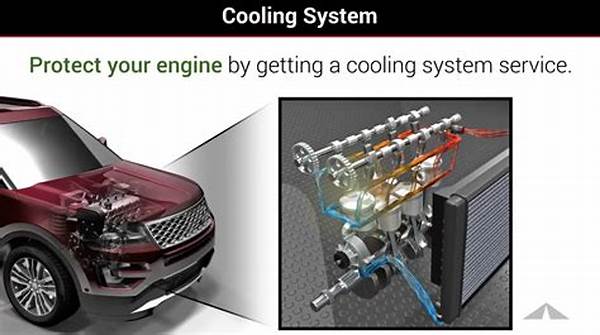
Importance Of Engine Cooling System
When you consider the intricate mechanics of an automobile, the importance of engine cooling system cannot be overstated. Imagine driving down a busy highway when suddenly, your engine overheats and you’re stranded on the shoulder with smoke billowing from under the hood. Such scenarios highlight why every vehicle requires a properly functioning cooling system. Not only does the cooling system regulate engine temperature, but it’s also pivotal in ensuring your vehicle’s longevity and optimal performance. Without it, engines would rapidly overheat and potentially fail, leading to costly repairs and replacements.
Read Now : **fuel System Cleaning Alerts**
How the Engine Cooling System Functions
The engine cooling system serves as the vehicle’s guardian against the destructive forces of excessive heat. It circulates coolant through the engine to absorb and dissipate heat, preventing the internal components from reaching critical temperatures. The importance of engine cooling system is seen in its ability to maintain the engine’s integrity and efficiency. This system, with its network of hoses, radiators, and fans, ensures that driving remains a smooth and stress-free experience. By controlling the heat, it protects the engine from the wear and tear that extreme temperatures can inflict, translating to fewer breakdowns and a more reliable vehicle lifespan.
Key Components of an Effective Cooling System
1. Radiator: The radiator plays a crucial role in the importance of engine cooling system by dissipating heat from the coolant.
2. Water Pump: It ensures the steady flow of coolant through the engine, highlighting the importance of engine cooling system.
3. Thermostat: This component regulates coolant flow, emphasizing the importance of engine cooling system by managing engine temperature effectively.
4. Cooling Fans: They enhance the cooling effect when the vehicle is stationary, showcasing the importance of engine cooling system.
5. Coolant Reservoir: Stores excess coolant, demonstrating the importance of engine cooling system in maintaining optimal fluid levels.
Maintaining Your Engine Cooling System
Regular maintenance ensures the resilience and efficiency of your cooling system. Delaying or ignoring maintenance can lead to corrosive damage, blockages, or leaks, all of which undermine the importance of engine cooling system. Routine checks help in identifying potential issues before they escalate into major problems. By doing so, you ensure that your engine runs smoothly without the risk of overheating, avoiding those dreaded breakdowns and saving on costly repairs. A proactive approach in caring for your cooling system is an unwavering investment in your vehicle’s future.
Frequent Issues in Cooling Systems and Their Solutions
1. Coolant Leaks: Promote awareness of the importance of engine cooling system’s role in spotting leaks early to prevent overheating.
2. Clogged Radiator: Understanding the importance of engine cooling system aids in recognizing and flushing out blockages.
3. Faulty Thermostat: Adequate knowledge of the importance of engine cooling system ensures timely thermostat replacement.
4. Worn-Out Hoses: Regular inspections highlight the importance of engine cooling system, detecting hose wear before failure.
5. Air Pockets in System: Efficient bleeding of air underscores the importance of engine cooling system for consistent temperature control.
Read Now : Professional Engine Repair Service
6. Defective Water Pump: Grasping the importance of engine cooling system enables preemptive pump checks.
7. Low Coolant Levels: Ensuring optimal levels reinforces the importance of engine cooling system in preventing overheating.
8. Old Coolant: Regular coolant refreshment signifies the importance of engine cooling system for effective heat absorption.
9. Radiator Fan Failure: Recognizing fan issues reflects the importance of engine cooling system in efficient cooling.
10. Corroded Radiator: Protecting against corrosion is a testament to the importance of engine cooling system longevity.
Best Practices for Cooling System Maintenance
Your engine’s cooling system is akin to its protective shield against excessive heat. Adopting best practices for maintenance reaffirms the importance of engine cooling system. Regularly inspect your cooling components, replace your coolant at recommended intervals, and check for leaks or corrosion. These actions not only preserve your vehicle but underscore a commitment to safety and efficiency on the road. Vehicle owners who prioritize the cooling system lay the foundation for a well-running engine that faithfully serves them over time.
Advanced Cooling System Tips
Enhancing the efficiency of your engine cooling system requires diligence and awareness. Incorporating advanced tips ensures the importance of engine cooling system is reflected in overall vehicle performance. Consider using high-quality coolants and keeping an eye on temperature gauges. Integrate regular system diagnostics into your maintenance routine to anticipate and mitigate potential issues. By taking these forward-thinking steps, you not only reassure yourself of your vehicle’s reliability but also enjoy peace of mind knowing that your engine is unfailingly protected.
Conclusions on Engine Cooling System Significance
The importance of engine cooling system is essential in safeguarding your vehicle’s heart: the engine. It takes more than basic knowledge to appreciate the complexity and necessity of this system fully. When maintained properly, it prolongs vehicle longevity and ensures smooth operation. A neglected cooling system, however, can quickly become a catalyst for engine damage and performance issues. Understanding this importance motivates drivers to prioritize their cooling system, ensuring an enduring relationship with their vehicle, free of the frustrations that engine overheating can cause.
By taking action today to care for your engine cooling system, you are investing in not only your vehicle’s health but also your ultimate driving satisfaction.